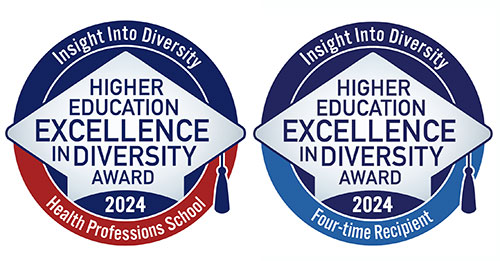October 16, 2024
K-State College of Veterinary Medicine receives 2024 Health Professions HEED Award

For the fourth year in a row, the College of Veterinary Medicine at Kansas State University has been recognized for its efforts to enhance diversity in its academic environment.
The college received the 2024 Health Professions Higher Education Excellence in Diversity, or HEED, Award from INSIGHT Into Diversity magazine, the oldest and largest diversity-focused publication in higher education.
As a recipient of the annual Health Professions HEED Award — a national honor recognizing U.S. health colleges and universities that demonstrate an outstanding commitment to diversity and inclusion — Kansas State University will be featured, along with 70 other recipients, in the November/December 2024 issue of INSIGHT Into Diversity magazine.
"We are grateful to be chosen a fourth time for the Health Professions HEED Award," said Bonnie Rush, Hodes family dean of the College of Veterinary Medicine. "As we prepare the leaders of tomorrow, we are committed to fostering the values of equity, respect, and dedication to learning and belonging as our extraordinary graduates move forward in their careers. I thank Dr. Callie Rost, our assistant dean for admissions and director of diversity, inclusion, equity and belonging, for helping our college maintain a high standard and continuing to lead our efforts for this critical mission."
INSIGHT Into Diversity magazine selected K-State because of the veterinary college's efforts to identify and incorporate opportunities for growth in diversity, equity and inclusion.
"Recognition from Insight into Diversity with the HEED Award reflects the efforts of our students, faculty and staff who take pride in contributing to the culture of inclusiveness in our college," Rost said.
Interested faculty, staff and students have independently pursued and completed educational programs such as the Purdue Certificate for Diversity and Inclusion in Veterinary Medicine and the American Veterinary Medical Association's Brave Space Certificate Program.
In addition to training, the college has two scholarships and a set of awards designated for demonstrating a commitment to bringing diverse people together and for serving disadvantaged populations. The Rural and Underrepresented Scholarship for Hopeful DVM students, or RUSH program, awarded the first five scholarships from an NIFA Higher Education Multicultural Scholars Program grant.
The College of Veterinary Medicine also experienced growth by expanding its recruiting practices with two USDA NIFA grants: SPARK and SPRINT. These programs focus on exposing students to rural veterinary practice in Kansas and recruiting and supporting students with an indigenous, native or tribal heritage.
Outreach activities include "This is How We ROLE," a program where veterinary students demonstrate the potential for a career in veterinary medicine to a local, underrepresented youth population. A large group of faculty, staff and students participate annually in "Everybody Counts – Manhattan," a grassroots effort to provide social services and information in Riley County.
The college's Community Veterinary Outreach Program regularly travels to provide animal health services at the Santee Sioux Reservation in Nebraska, the Metro Lutheran Ministry Mission in Kansas City, Missouri, the Street Dog Coalition in Topeka and other regional locations.
